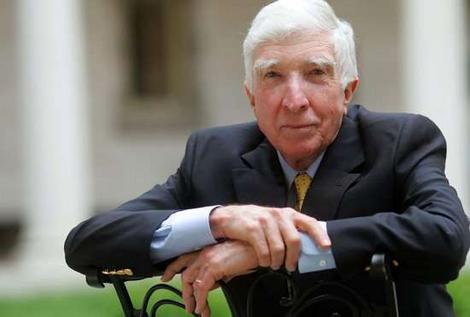
John Updike Residence

Boston, MA 02116 United States
When John Hoyer Updike published his first short story in the New Yorker at the age of 22, he described the moment as “the ecstatic breakthrough of my literary life,” but it also couldn’t have been much of a surprise. Born in 1932, and raised in small-town Pennsylvania, Updike was always a consummate student. He took an early interest in literature and cartooning, inspired by his mother’s success publishing fiction in magazines like The New Yorker. He was co-valedictorian at his high school; attended Harvard on scholarship, where he edited The Harvard Lampoon, and completed a year-long fellowship at the Ruskin School of Drawing and Fine Arts in Oxford.
After marrying art student Mary Entwistle Pennington, the couple settled down and raised a family in Ipswich, MA, and the bucolic setting invigorated Updike’s imagination. At a pace of roughly a book a year, he published 60 full-length works throughout his prolific career, including hundreds of short stories, poems, and essays. Many of his books and stories portrayed fictionalized versions of his ordinary hometown, including the acclaimed Rabbit tetralogy that follows small-town athlete Harry “Rabbit” Angstrom over the course of his life as he navigates a loveless marriage and unfulfilling sales job.
America’s bard of the middle-class everyman has described his fascination with middles as the place where “extremes clash, where ambiguity restlessly rules.” The Rabbit novels, along with books like Couples and In the Beauty of the Lilies, were controversial for their frank depiction of sexual relationships in quaint suburban settings, where the narrators were often men guilty of infidelity and abandonment.
Updike is one of only three writers to win the Pulitzer Prize for Fiction more than once (Booth Tarkington; William Faulkner), though he never won the Nobel Prize for Literature. And despite his monumental legacy, the painterly quality of his prose continues to inspire debate around whether the work offers a serious engagement with the world, or is more style than content. Updike indirectly addressed this dispute when he described the purpose of his prose as “giving the mundane its beautiful due.” One example from the short story “A Sense of Shelter”:
“Snow fell against the high school all day, wet big-flake snow that did not accumulate well. Sharpening two pencils, William looked down on a parking lot that was a blackboard in reverse; car tires had cut smooth arcs of black into the white, and wherever a school bus had backed around, it had left an autocratic signature of two V’s.”
Updike passed away at the age of 76 in Danvers, MA.
Upcoming Events
- There were no results found.
Events List Navigation
Events List Navigation
Did You Know?
Certain books were “banned in Boston” at least as far back as 1651, when one William Pynchon wrote a book criticizing Puritanism.